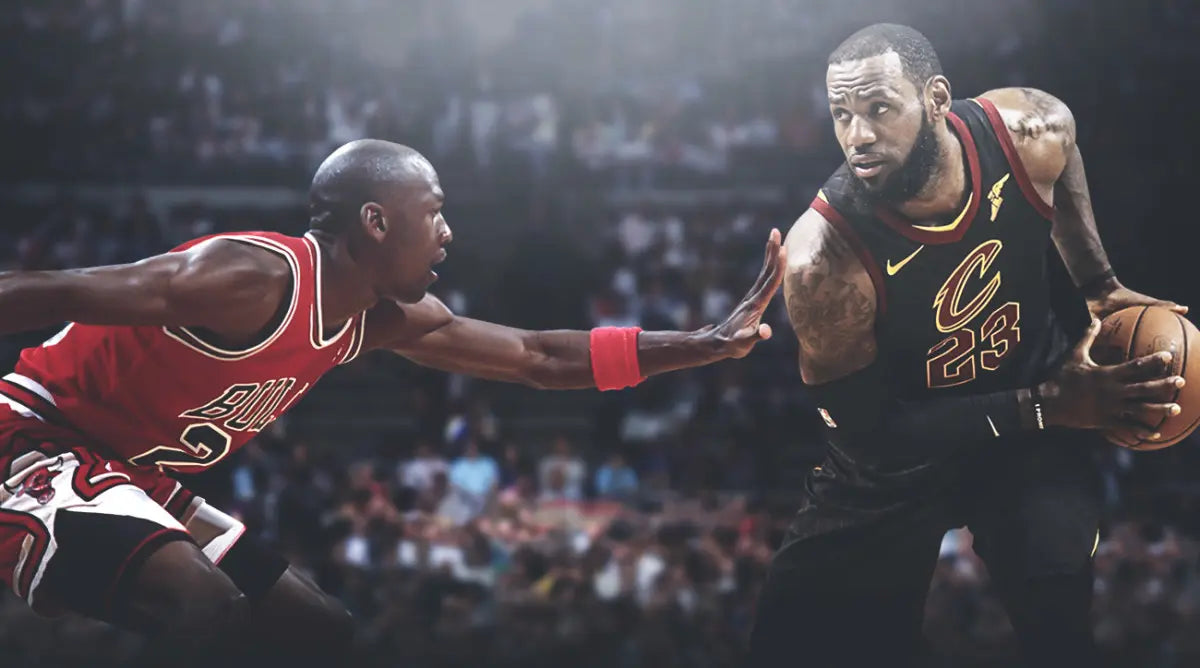Whether you are passionate about basketball or simply curious, the debate surrounding the GOAT (Greatest Of All Time) is always captivating. In the modern NBA, two giants dominate the spotlight: Michael Jordan and LeBron James. This detailed comparison examines their careers based on achievements, statistics, longevity, playoff impact, playing style, leadership, and the lasting legacy they have left on the NBA.
Context
For several decades, the NBA has been driven by the exploits of exceptional players. Michael Jordan, who ruled the 1990s, and LeBron James, dominating since the 2000s, are often cited in discussions about the greatest basketball player of all time. Each has distinguished himself through outstanding achievements, media impact, and influence on the game.
1. Achievements (titles and distinctions)
Michael Jordan: 6 NBA titles (1991, 1992, 1993, 1996, 1997, 1998), 6 Finals MVP trophies, 5 MVP awards, 14 All-Star selections, 9 All-Defensive First Team selections, and Olympic gold medals (1984, 1992).
LeBron James: 4 NBA titles (2012, 2013, 2016, 2020), 4 Finals MVPs, 4 MVP awards, 19 All-Star selections, 6 All-Defensive Team selections (5 First Team, 1 Second Team), and Olympic gold medals (2008, 2012).
Jordan remains undefeated in Finals (6-0), while LeBron has played in 10 NBA Finals. Their defensive distinctions and Olympic medals further add to their international prestige.
| Year | Champion | Runner-up | Finals MVP | Season MVP |
|---|---|---|---|---|
| 1990 | Detroit Pistons | Portland Trail Blazers | Isiah Thomas | Magic Johnson |
| 1991 | Chicago Bulls | Los Angeles Lakers | Michael Jordan | Michael Jordan |
| 1992 | Chicago Bulls | Portland Trail Blazers | Michael Jordan | Michael Jordan |
| 1993 | Chicago Bulls | Phoenix Suns | Michael Jordan | Charles Barkley |
| 1994 | Houston Rockets | New York Knicks | Hakeem Olajuwon | Hakeem Olajuwon |
| 1995 | Houston Rockets | Orlando Magic | Hakeem Olajuwon | David Robinson |
| 1996 | Chicago Bulls | Seattle SuperSonics | Michael Jordan | Michael Jordan |
| 1997 | Chicago Bulls | Utah Jazz | Michael Jordan | Karl Malone |
| 1998 | Chicago Bulls | Utah Jazz | Michael Jordan | Michael Jordan |
| 1999 | San Antonio Spurs | New York Knicks | Tim Duncan | Karl Malone |
| 2000 | Los Angeles Lakers | Indiana Pacers | Shaquille O’Neal | Shaquille O’Neal |
| 2001 | Los Angeles Lakers | Philadelphia 76ers | Shaquille O’Neal | Allen Iverson |
| 2002 | Los Angeles Lakers | New Jersey Nets | Shaquille O’Neal | Tim Duncan |
| 2003 | San Antonio Spurs | New Jersey Nets | Tim Duncan | Tim Duncan |
| 2004 | Detroit Pistons | Los Angeles Lakers | Chauncey Billups | Kevin Garnett |
| 2005 | San Antonio Spurs | Detroit Pistons | Tim Duncan | Steve Nash |
| 2006 | Miami Heat | Dallas Mavericks | Dwyane Wade | Steve Nash |
| 2007 | San Antonio Spurs | Cleveland Cavaliers | Tony Parker | Dirk Nowitzki |
| 2008 | Boston Celtics | Los Angeles Lakers | Paul Pierce | Kobe Bryant |
| 2009 | Los Angeles Lakers | Orlando Magic | Kobe Bryant | LeBron James |
| 2010 | Los Angeles Lakers | Boston Celtics | Kobe Bryant | LeBron James |
| 2011 | Dallas Mavericks | Miami Heat | Dirk Nowitzki | Derrick Rose |
| 2012 | Miami Heat | Oklahoma City Thunder | LeBron James | LeBron James |
| 2013 | Miami Heat | San Antonio Spurs | LeBron James | LeBron James |
| 2014 | San Antonio Spurs | Miami Heat | Kawhi Leonard | Kevin Durant |
| 2015 | Golden State Warriors | Cleveland Cavaliers | Andre Iguodala | Stephen Curry |
| 2016 | Cleveland Cavaliers | Golden State Warriors | LeBron James | Stephen Curry |
| 2017 | Golden State Warriors | Cleveland Cavaliers | Kevin Durant | Russell Westbrook |
| 2018 | Golden State Warriors | Cleveland Cavaliers | Kevin Durant | James Harden |
| 2019 | Toronto Raptors | Golden State Warriors | Kawhi Leonard | Giannis Antetokounmpo |
| 2020 | Los Angeles Lakers | Miami Heat | LeBron James | Giannis Antetokounmpo |
| 2021 | Milwaukee Bucks | Phoenix Suns | Giannis Antetokounmpo | Nikola Jokić |
| 2022 | Golden State Warriors | Boston Celtics | Stephen Curry | Nikola Jokić |
| 2023 | Denver Nuggets | Miami Heat | Nikola Jokić | Joel Embiid |
| 2024 | Boston Celtics | Dallas Mavericks | Jaylen Brown | Nikola Jokić |
| 2025 | - | - | - | - |
Statistical Comparison: Jordan vs. LeBron
This section provides a brief comparison of the career statistics and major distinctions between Michael Jordan and LeBron James.
| Statistics / Distinctions | Michael Jordan | LeBron James |
|---|---|---|
| Date of Birth | 17 February 1963 | 30 December 1984 |
| NBA Titles | 6 | 4 |
| Regular Season MVP | 5 | 4 |
| Finals MVP | 6 | 4 |
| All-Star Selections | 14 | 19 |
| Olympic Medals | 2 (1984, 1992) | 3 (2008, 2012, 2024) |
| Career Points Average | 30.1 | ~27.2 |
| Career Rebounds Average | 6.2 | ~7.5 |
| Career Assists Average | 5.3 | ~7.3 |
| Career Points Record (Regular Season) | 32,292 | 38,000+ (NBA record) |
| Shooting Percentage | ~49.7% | ~50% |
| Finals Played | 6 (6-0) | 10 (4-6) |
Last updated: early 2025
2. Longevity and Consistency
Michael Jordan: A career marked by two retirements but defined by dominant performances over a shorter period.
LeBron James: Over 20 seasons at the top, consistently an All-Star and impactful even in later years, showing remarkable durability and sustained MVP-level performance.
3. Playoff Impact and the Ability to be “Clutch”
Michael Jordan: 6 Finals, 6 titles, and 6 Finals MVPs. He boasts a playoff scoring average of 33.4 points, along with legendary game-winning shots.
LeBron James: 10 Finals appearances with 4 titles, and his playoff statistics rank among the best in history. His 3-1 comeback in 2016 is a landmark achievement. While Jordan epitomizes the “killer instinct,” LeBron consistently elevates his performance in high-pressure situations.
4. Playing Style and Influence on Basketball
Michael Jordan: Known for exceptional scoring ability, elite defense, and iconic marketing with Air Jordan. His aggressive offensive style and legendary fadeaway jump shot set him apart.
LeBron James: Renowned for his unmatched versatility in scoring, passing, and rebounding. He embodies the modern player capable of excelling at multiple positions and leading his team effectively.
5. Leadership and Impact on Teammates
Michael Jordan: His ultra-competitive nature and demanding leadership style pushed his teammates to excel, contributing to the Chicago Bulls' dynasty.
LeBron James: A relational leader known for transforming teams into title contenders. His leadership in Cleveland, Miami, and Los Angeles has consistently led to Finals appearances.
6. Role in History and the Legacy Left on the NBA
Popularity and Image: Jordan became a global brand with Air Jordan, symbolizing the 1990s. LeBron is a modern icon, actively engaged in social and media endeavors.
League Expansion: Jordan helped propel the NBA onto the international stage, while LeBron has consolidated its popularity in the era of social media.
Social Engagement: Jordan inspired a generation, whereas LeBron actively advocates for social causes such as education and justice, exemplifying player empowerment.
Conclusion and Verdict
Ultimately, in terms of pure performance, global influence, and achievements, Michael Jordan remains the archetype of the ultimate champion. His undefeated Finals record and cultural impact solidify his status as an unrivaled icon.
Our verdict: Michael Jordan is awarded the title of GOAT due to his dominant 1990s era, record-breaking playoff performances, and unmatched legacy. While LeBron James’ longevity and accomplishments are remarkable, Jordan's imprint on NBA history remains unique and unassailable.












Share: